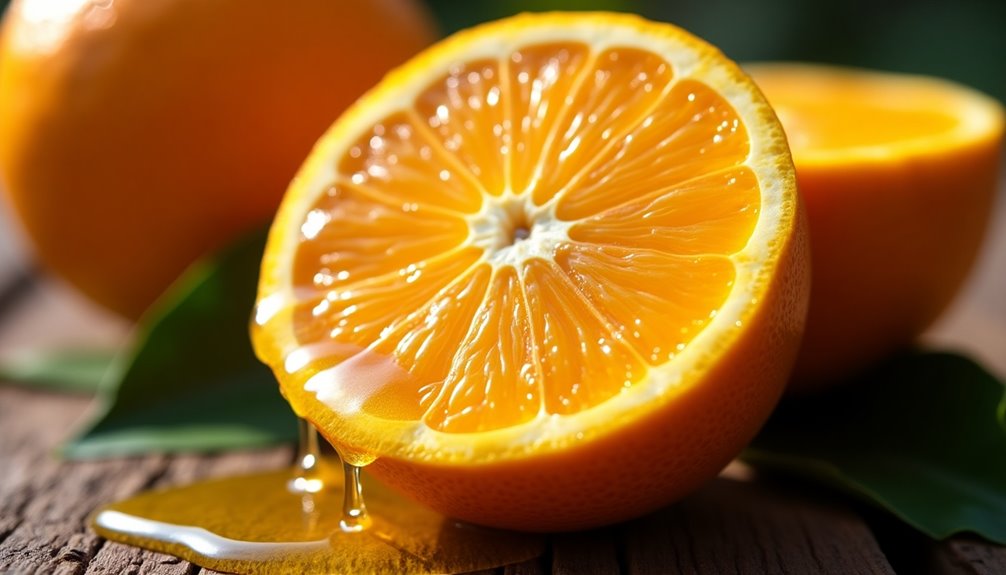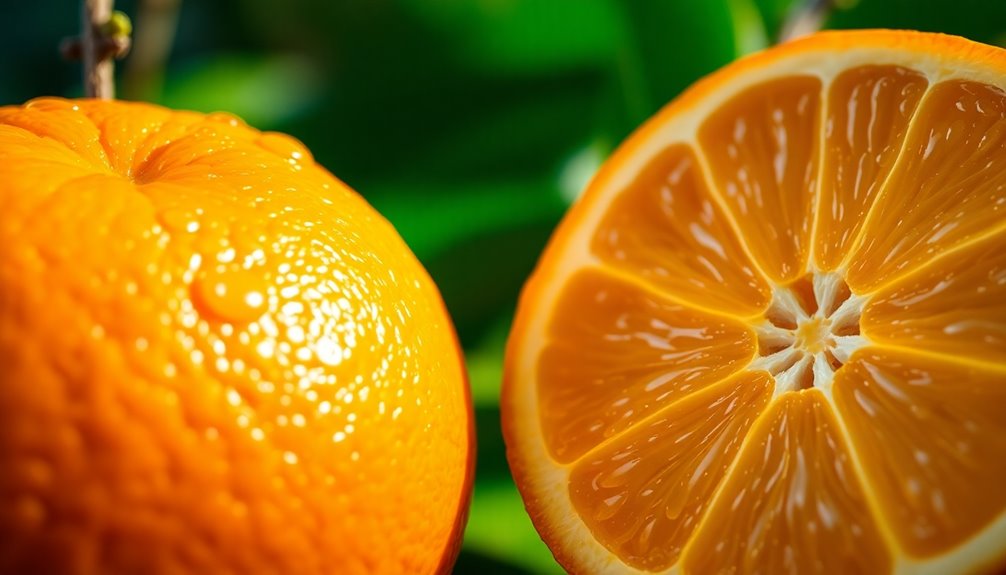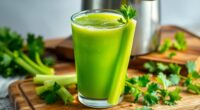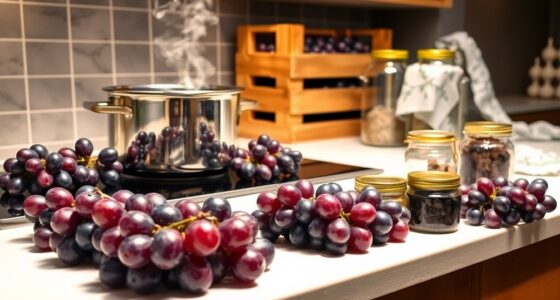A medium-sized orange typically gives you about 4 to 5 tablespoons of juice, which is around 1/4 to 1/3 of a cup. That means one orange usually isn't enough for a full glass of juice. If you want to make a full cup, you'll need about three oranges. The type of orange can also affect the juice yield, so it helps to choose juicy varieties. Keep going to discover more tips on making fresh orange juice!
Key Takeaways
- A medium-sized orange yields approximately 4 to 5 tablespoons of juice.
- This amount is roughly equivalent to 1/4 to 1/3 of a cup.
- One orange typically does not provide enough juice for a full glass.
- For a complete cup of juice, around three medium oranges are needed.
- Juice yield can vary based on the orange variety, with Valencia and navel oranges being the most productive.

Ever wondered how much juice you can squeeze from one orange? If you've ever tried to make fresh orange juice at home, you might've noticed that not all oranges are created equal when it comes to juice yield. Generally, a medium-sized orange will give you about 4 to 5 tablespoons of juice, which is roughly equivalent to 1/4 to 1/3 of a cup. That might sound like a decent amount, but when you're craving fresh orange juice, you'll quickly realize that you need more than just one orange to fill your glass.
To get a full cup of fresh-squeezed orange juice, you'll typically need about three medium-sized oranges. This means you're looking at a total juice yield of around 12 to 15 tablespoons, or 3/4 to 1 cup, which is perfect for that morning breakfast or a refreshing afternoon treat. If you're wondering how to convert fresh oranges into juice, now you know that having a few on hand can really make a difference in your juice game.
The specific variety of orange you use can also affect the amount of juice you get. For example, Valencia oranges are known for their juiciness, while navel oranges offer a sweet and tangy flavor that many people enjoy. Blood oranges, with their unique color and flavor profile, can also yield a delightful juice, although the amount may vary. So, if you're looking for the best juice yield, stick with medium-sized Valencia or navel oranges for the sweetest results.
It's also worth noting that a pound of oranges, which usually consists of about two medium-sized fruits, can yield approximately 8 to 10 tablespoons of juice. If you're planning to make a big batch of fresh orange juice for a gathering, keep this in mind. You can save time and ensure you have enough juice by buying your oranges by weight instead of by the piece.
Besides tasting great, fresh orange juice is packed with vitamin C, making it not just delicious but also a nutritious addition to your diet. Starting your day with a glass of fresh-squeezed orange juice can give you a boost of energy and help support your immune system.
Frequently Asked Questions
How Much Juice Do You Get From 1 Orange?
When you squeeze a medium-sized orange, you can expect to get around 4 to 5 tablespoons of juice, which translates to about 1/4 to 1/3 cup.
The amount can vary based on the orange's size and ripeness—riper oranges typically yield more juice.
If you're aiming for a full cup of juice, you'll need to juice about three oranges.
How Many Oranges for 8 Oz of Juice?
To get 8 ounces of orange juice, you'll need about 3 to 4 medium-sized oranges.
Each orange typically provides around 2 to 3 ounces of juice, so using four should give you a little extra.
Keep in mind that the size and ripeness of the oranges can affect your yield, so pick juicy, ripe ones for the best results.
Enjoy your fresh juice!
How Many Oranges Does It Take to Make 12 Ounces of Juice?
To make 12 ounces of juice, you'll need about 6 medium-sized oranges. Each orange typically yields around 2 ounces, so that adds up nicely.
Keep in mind, though, that the actual amount can vary based on the size and ripeness of the oranges. It's also wise to have a couple of extra oranges on hand, just in case some don't yield as much juice as you'd hoped.
Enjoy your fresh juice!
How Many Oranges Does It Take to Make 16 Oz of Juice?
You'd think making 16 ounces of orange juice is a breeze, right?
Well, it actually takes around 10 to 12 medium-sized oranges, especially if you're using Valencia varieties. Each orange typically yields about 4 to 5 tablespoons of juice, so you'll need to squeeze quite a few.
Keep in mind, the size and ripeness of the oranges play a big role in how much juice you get, so choose wisely!
Conclusion
In conclusion, when you juice one orange, you can expect to get about 2 to 4 ounces of that vibrant, zesty goodness. It’s like capturing a burst of sunshine in a glass! So, next time you’re craving a refreshing drink, remember that a single orange can bring a splash of summer to your day. Whether you sip it straight or mix it in a smoothie, that orange juice is sure to brighten your spirits! You might wonder, how much juice from an orange is necessary to quench your thirst or elevate your breakfast. A couple of oranges can yield enough juice to create a delightful serving for yourself or to share with friends. So, don’t hesitate to stock up on this fabulous fruit; your taste buds and your mood will thank you!
Cindy thoroughly researches juicing trends, techniques, and recipes to provide readers with practical advice and inspiration. Her writing style is accessible, engaging, and designed to make complex concepts easy to understand. Cindy’s dedication to promoting the advantages of juicing shines through her work, empowering readers to make positive changes in their lives through the simple act of juicing.
















